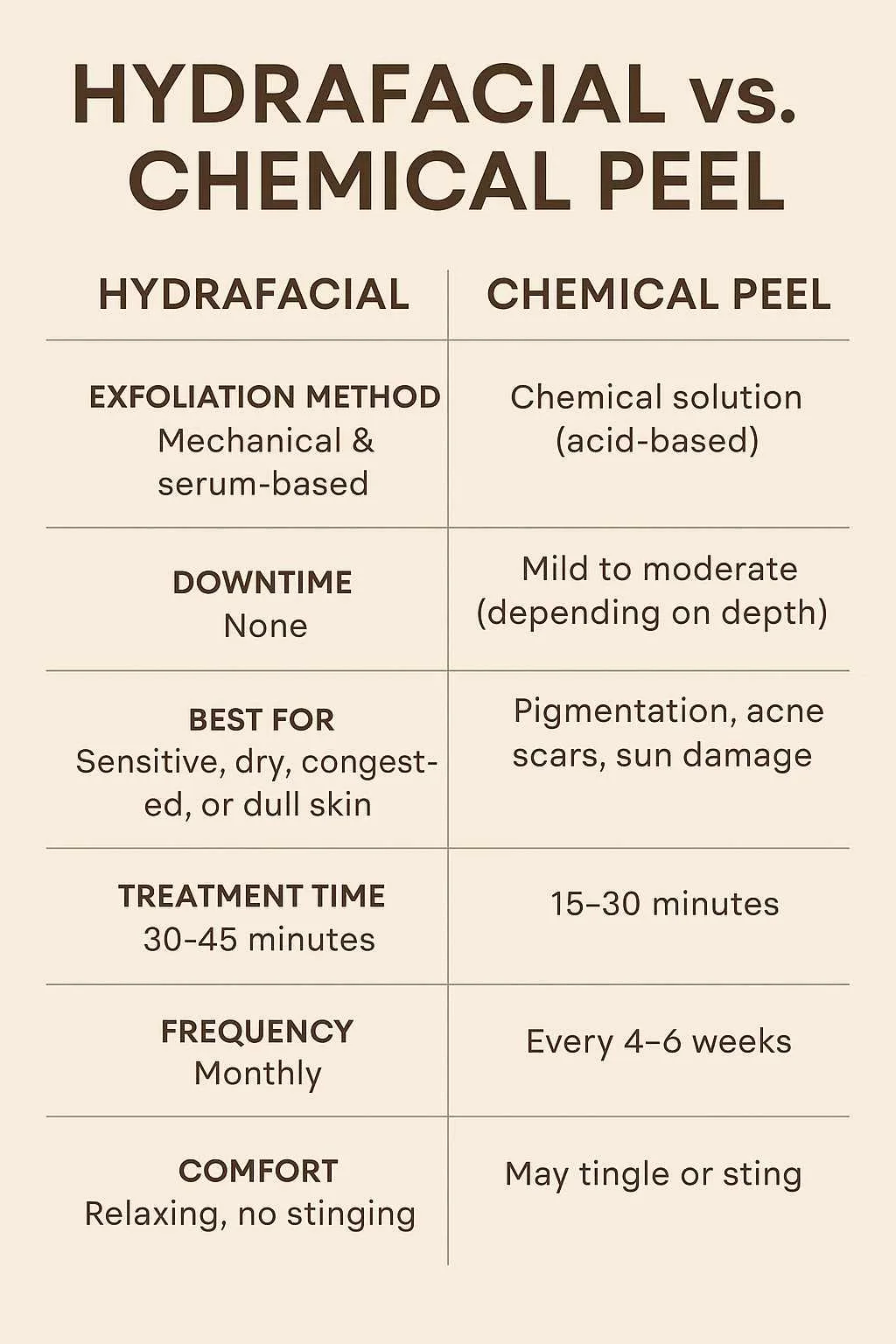
Trying to decide between a HydraFacial or a Chemical Peel for smoother, clearer, and more radiant skin? You’re not alone. These two treatments are among the most requested services at Skin Works Medical Spa—but they work in very different ways.
In this article, we break down the differences, benefits, and best uses for each treatment, so you can choose the right one for your skin type and goals.
What’s the Difference Between HydraFacial and Chemical Peel?
🌀 HydraFacial:
- Uses a medical-grade device to cleanse, exfoliate, extract, and hydrate
- Combines gentle suction and serums infused into skin
- Non-invasive and highly customizable
- No downtime or irritation
📖 Learn more on our HydraFacial service page
🧪 Chemical Peel:
- Applies acid-based solution to exfoliate damaged outer layers
- Stimulates skin renewal and collagen production
- Can be light, medium, or deep depending on skin needs
- May involve flaking, redness, and short downtime
📖 Explore our Chemical Peels menu
HydraFacial vs. Chemical Peel Comparison
| Feature | HydraFacial | Chemical Peel |
|---|---|---|
| Exfoliation Method | Mechanical & serum-based | Chemical solution (acid-based) |
| Downtime | None | Mild to moderate (depending on depth) |
| Best For | Sensitive, dry, congested, or dull skin | Pigmentation, acne scars, sun damage |
| Treatment Time | 30–45 minutes | 15–30 minutes |
| Frequency | Monthly | Every 4–6 weeks |
| Comfort | Relaxing, no stinging | May tingle or sting |
Which One Is Better for Your Skin?
✅ Choose HydraFacial If You:
- Have sensitive or reactive skin
- Want instant glow without downtime
- Need extra hydration and deep cleansing
- Want to prep your skin before a big event
✅ Choose Chemical Peel If You:
- Struggle with hyperpigmentation or acne scars
- Want deeper skin resurfacing
- Can tolerate mild flaking or downtime
- Need collagen stimulation for aging skin
Safety and Side Effects
Both treatments are safe when performed by licensed professionals. At Skin Works, we customize your treatment and concentration level based on your skin type, goals, and sensitivity.
HydraFacial: No irritation, redness, or peeling.
Chemical Peel: May cause temporary redness, dryness, or peeling (especially with medium-depth options).
Can They Be Combined?
Yes—many patients alternate HydraFacials and chemical peels for optimal skin health. HydraFacial preps and hydrates, while chemical peels resurface and renew. During your consultation, we’ll help you plan a treatment strategy that fits your skin and schedule.
Final Thoughts: HydraFacial vs. Chemical Peel
Each treatment offers unique benefits—and the best one depends on your skin condition, goals, and downtime tolerance. Whether you want glow without recovery or deeper correction, Skin Works Medical Spa has a plan tailored to you.
🎯 Let’s create a skincare strategy that works for your lifestyle and skin goals.
References
- HydraFacial for Active Acne Improvement – PubMed 36569524
- Chemical Peels Review in Aesthetic Dermatology – PubMed 19744174
- Evidence & Considerations in Clinical Use of Chemical Peels – JCAD Online
Disclaimer: This article is for educational purposes only and does not substitute professional advice. Please consult a licensed provider for personalized recommendations.